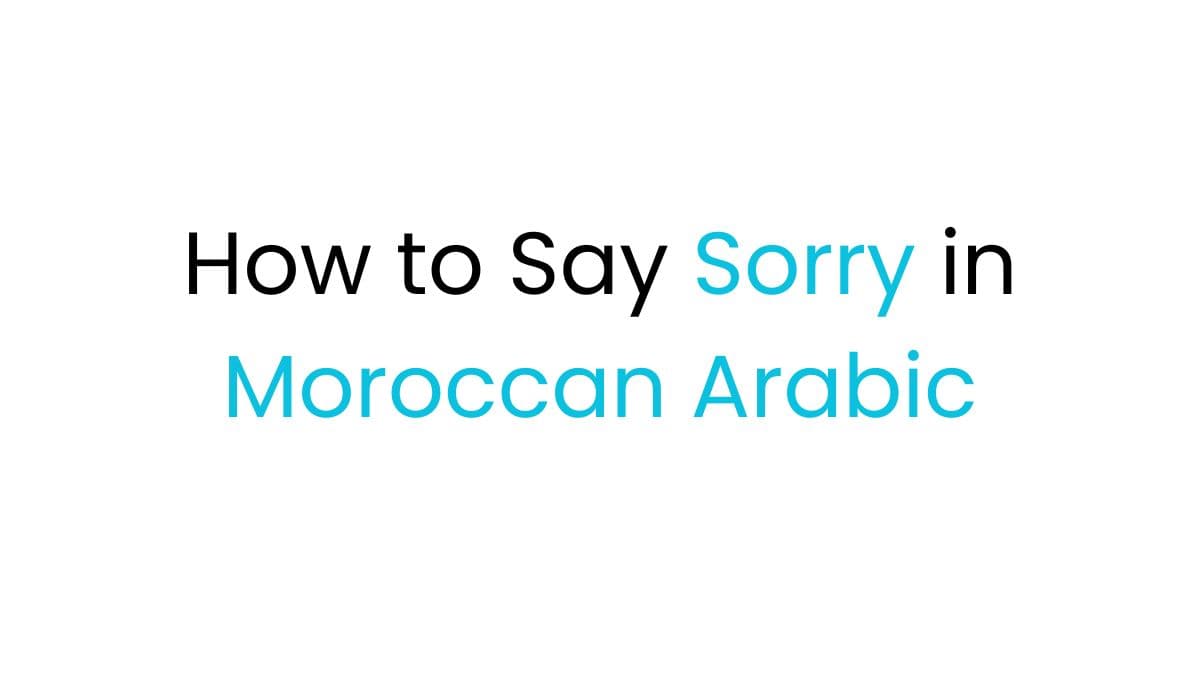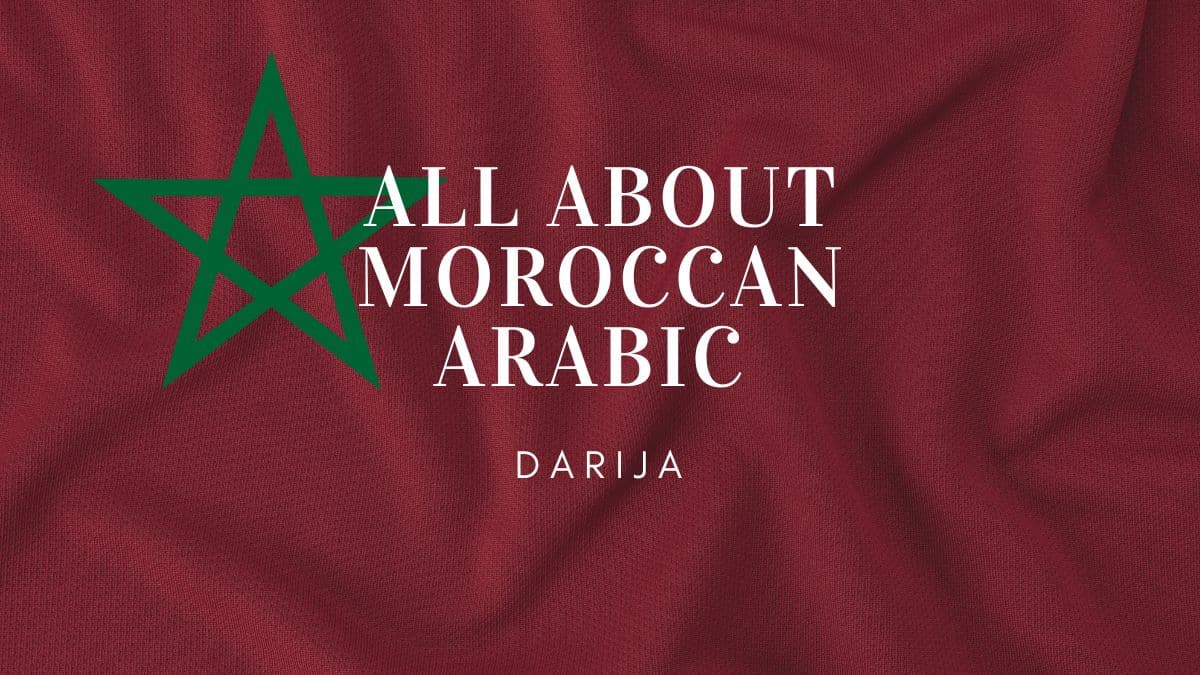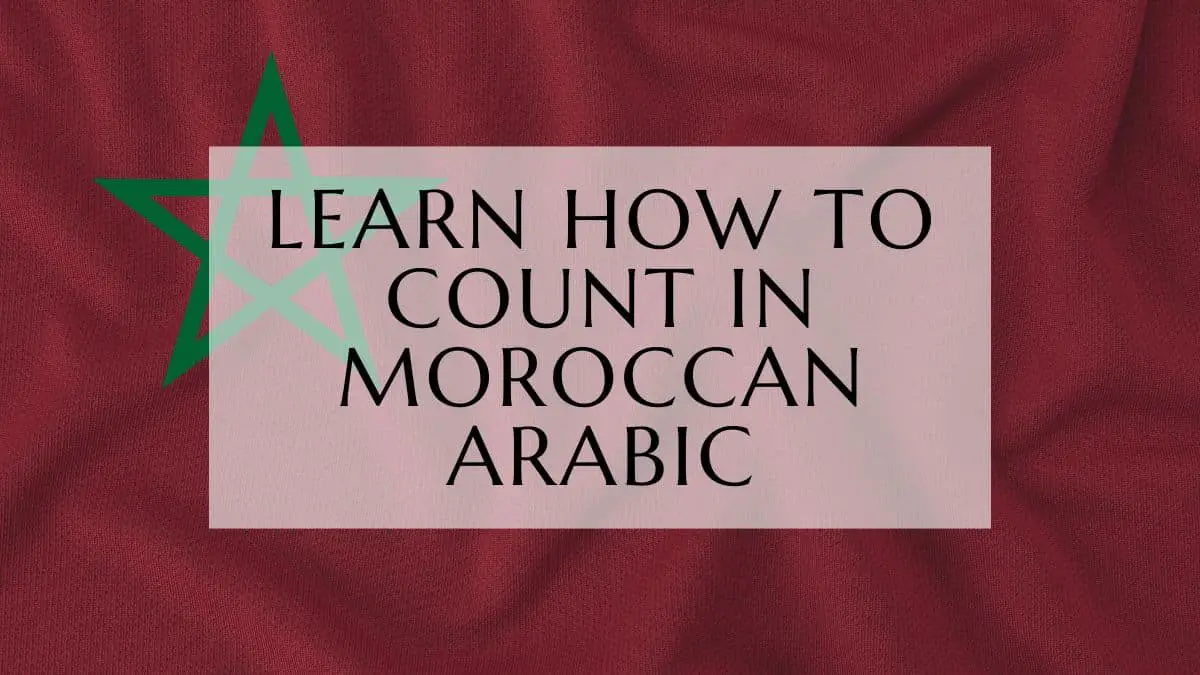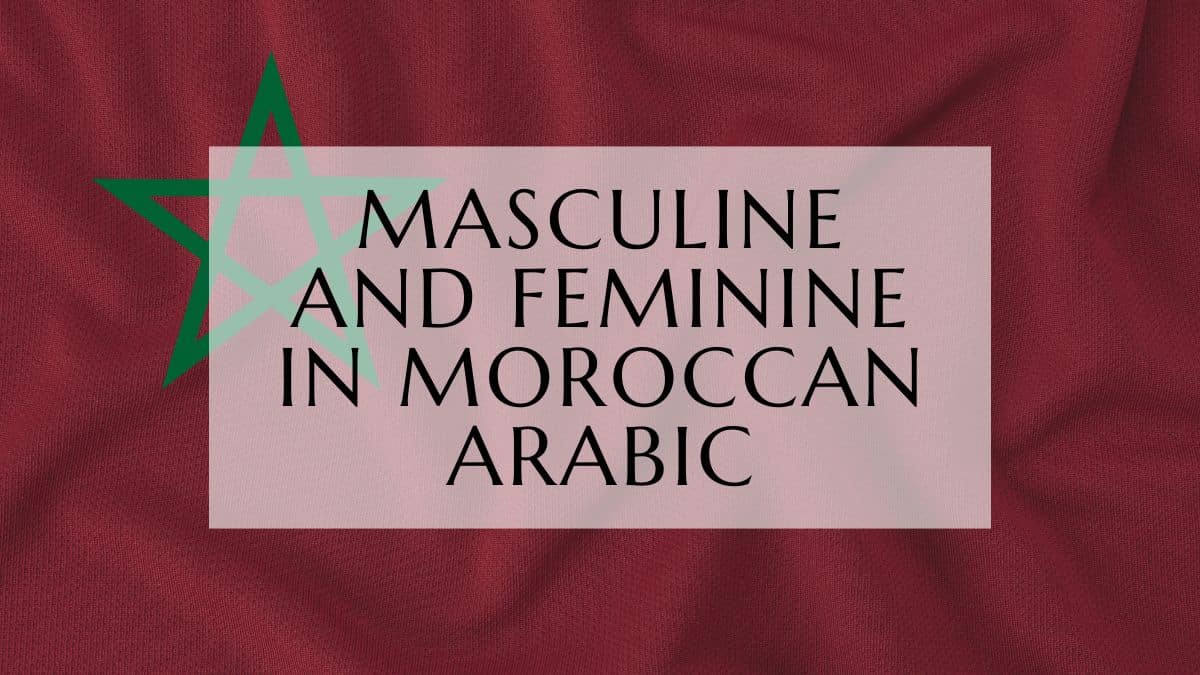Making mistakes is something we all do, which is why learning to apologize is crucial. You might need to say you’re sorry for many reasons, like when someone has passed away or when you need to get through a crowd. Just as there are different ways to apologize in English, there are many ways to say “sorry” in Moroccan Arabic too. You might know the basics like “سمحلي (smahli / pardon)” and “أنا متأسف (ana mat assaf / I’m sorry)”. But this article will explore more situations and phrases you can use in each one.

Common Ways to Say I’m Sorry in Moroccan Arabic
In Moroccan Arabic, there are many ways to say “I’m sorry.” You can say “أنا متأسف (ana mat assaf / I’m sorry),” “سمحلي (smahli / pardon),” “سمحيلي (samhili / pardon me – female),” or “كنطلب منك السماحة (kanatlab mannek smaha / I apologize).” It’s important to know these expressions to communicate well in Darija.
سمحلي (smahli / Pardon)
سمحلي (smahli / pardon) is a common way to say “sorry” in Moroccan Arabic. You can use it for many situations, like bumping into someone or dropping something. You can also say سمحلي بزاف (smahli bezzaf / I’m very sorry) to ask for forgiveness.
أنا متأسف (ana mat assaf / I’m sorry)
أنا متأسف (ana mat assaf / I’m sorry) is another way to say “I’m sorry” in Moroccan Arabic. It shows regret for someone’s loss or deeper regret for serious situations. Adding بزاف (bezzaf / very) or من القلب (men lqalb / from the heart) makes the apology more sincere.
“ماراكش عارف شحال أنا متأسف” – “You have no idea how sorry I am.”
The verb “شعر” means “to feel” and is used to express regret. Saying كنحس… (kanhs…) followed by different words can show you’re sorry or regretful.
Formal Apologies in Moroccan Arabic
When you need to say sorry in Moroccan Arabic, there are formal phrases that show deep regret. One key phrase is “كنطلب منك السماحة (kanatlab mannek smaha / I ask for your forgiveness).” The “كنطلب (kanatlab)” version is for friends, and the “تفضل (tfaḍḍal)” version is for elders or those you respect more.
For a deeper apology, try “كنطلب منك السماحة من القلب (kanatlab mannek smaha men lqalb / I sincerely apologize).” This shows you’re truly sorry from your heart. It’s more than just saying “أنا متأسف (ana mat assaf / I’m sorry).”
Choosing how to apologize in Moroccan Arabic depends on the situation and your relationship with the person. Knowing these differences helps you apologize in a way that’s right and meaningful.
Saying Excuse Me in Moroccan Arabic
Learning to say “excuse me” in Moroccan Arabic is useful in crowded places or when you need to interrupt. There are several ways to express this, each with its own level of formality.
سمحيلي / سمحلي (smahli / samhili / Excuse me)
سمحيلي (smahli / excuse me – male) is a common way to say “excuse me” in Moroccan Arabic. It’s used to get someone’s attention, ask them to move, or interrupt a conversation politely. سمحيلي (samhili) and سمحلي (smahli) are the informal and formal versions, used in similar situations.
Knowing these ways to say “excuse me” in Moroccan Arabic helps you talk and act more smoothly with Darija speakers. It shows respect and thoughtfulness towards them.
Sorry in Moroccan Arabic Expressions for Empathy
In Moroccan Arabic, saying “أنا متأسف (ana mat assaf)” or “كنحس بشي اللي وقع (kanhs bshi lli waqa’ / I feel what happened)” shows empathy. It means “I’m sorry about what happened.” This lets you express concern and sympathy without taking blame.
Using “كنتأسف بزاف (kant-assaf bezzaf)” shows you deeply care about the person’s trouble. Phrases like “ماراكش عارف شحال أنا متأسف (marakch ‘arf shhal ana mat assaf)” and “شحال أنا متأسف! (shhal ana mat assaf!)” highlight your deep empathy.
These apologies in Moroccan Arabic aren’t about saying you’re wrong. They’re about showing you get how hard it is for the other person. They show you want to help and support them in tough times.
Accepting Apologies in Moroccan Arabic
When someone apologizes to you in Moroccan Arabic, knowing how to accept it is key. Saying “سمحتلك (smahtlek / I forgive you)” or “راك مسامح (rak msamih / You’re forgiven)” is a simple way to do this. These phrases show you’ve forgiven them and there are no hard feelings.
If the issue was minor and it didn’t upset you much, you can say “ما وقع والو (mawqa’ walo / Don’t worry about it)” or “ماكاين مشكيل (makayen mushkil / No problem).” These say you accept the apology and don’t want the person to feel bad. Saying “شكرا حيت طلبتي السماحة (shukran hit tlabti smaha / Thank you for apologizing)” also shows you value their apology.
| Moroccan Arabic Phrase | English Translation | Formality Level |
|---|---|---|
| سمحتلك (smahtlek) | I forgive you | Formal/Informal |
| راك مسامح (rak msamih) | You’re forgiven | Formal/Informal |
| ما وقع والو (mawqa’ walo) | Don’t worry about it | Informal |
| ماكاين مشكيل (makayen mushkil) | No problem | Informal |
| شكرا حيت طلبتي السماحة (shukran hit tlabti smaha) | Thank you for apologizing | Formal/Informal |
Accepting apologies in Moroccan Arabic can ease tense situations and keep relationships positive. By being empathetic and forgiving, you show the person you value their effort to make things right.
Saying Sorry in Moroccan Arabic – Examples
To understand how to say sorry in Moroccan Arabic, let’s look at some common examples and situations. If you accidentally bump into someone, say “سمحلي، ما شفتكش (smahli, mashefteksh / I’m sorry, I didn’t see you)” or “سمحلي (smahli / I’m sorry).” When someone close to you has passed away, say “كنحس بزاف بلي وقع لعمتك (kanhs bezzaf bli waqa l3mtk / I’m very sorry about your aunt)” or “كنحس بخسارتك (kanhs bkhstartk / I’m sorry for your loss).”
In formal situations, like asking for something, say “سمحلي، واش تقدر تعاود السؤال؟ (smahli, wash teqdar te’aud su’al? / I’m sorry, could you repeat the question?)” or “سمحلي، تقدر دوزلي الما؟ (smahli, teqdar dewezli lma? / Excuse me, can you pass the water?).”
When you’ve made a mistake, apologize by saying “سمحلي حيت جيت معطل (smahli hit jit m’attal / I’m sorry I’m late),” “أنا متأسف، كانت غي صدفة (ana mat assaf, kanat ghi sudfa / I’m sorry, it was an accident),” or “كنطلب منك السماحة من القلب. ما عرفت ماندير (kanatlab mannek smaha men lqalb. ma ‘reft mandir / I sincerely apologize. I don’t know what to say).”
| Situation | Moroccan Arabic Phrase | English Translation |
| Accidentally bumping into someone | سمحلي، ما شفتكش (smahli, mashefteksh) | I’m sorry, I didn’t see you |
| Asking for something politely | سمحلي، واش تقدر تعاود السؤال؟ (smahli, wash teqdar te’awd suaal?) | I’m sorry, could you repeat the question? |
| Apologizing for being late | سمحلي حيت جيت معطل (smahli hit jit m’attal) | I’m sorry I’m late |
| Deep, sincere apology | كنطلب منك السماحة من القلب. ما عرفت ماندير (kanatlab mannek smaha men lqalb. ma’reft mandir) | I sincerely apologize. I don’t know what to say |
Using these phrases in Moroccan Arabic will help you communicate clearly and effectively, whether you’re saying sorry for something small or offering a deep, heartfelt apology.
Oualid Cheddadi is the founder of Lingualid, a platform that inspires independent language learners worldwide, regardless of the language they are learning. The name “Lingualid” is derived from the Portuguese word for “language,” “língua,” and the last three letters of Oualid’s name, “Lid.”




